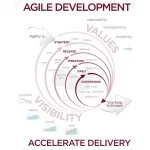Waterfall works when…
I frequently find myself in situations where someone says something like: “Waterfall is appropriate when…”
Some people out there think there are occasions when an Agile (mainly iterative) approach is “best’ and other occasions when “Waterfall” is “best”. Most of the time I let this line of argument go because its boring, I can’t be bothered arguing. (I’ll look at some of these common objections next time). Right now lets get something out in the open:
- Before you make any decision on Waterfall or Agile define what you mean by “Agile” and “Waterfall”.
- The decision to work Agile or Waterfall should not be based on which is more appropriate.
- The decision on whether to work Agile or Waterfall should be a based on an examination of the business benefits.
Briefly, let me define “Agile” as working and delivering in short iterations and “Waterfall” as delivering in a single pre-planned event.
In cold hard cash the benefits to the business are:
- Agile working produces a far higher return on investment because benefits are delivered sooner.
- Agile reduces risk because risk is spread across many independent (consecutive) deliveries.
- Agile further reduces risk because failure can be identified sooner thereby saving money and time (Fail fast, fail cheap).
Without any other changes I can prove those improvements: they are objective. Using just mathematics without reference to any subjective opinion I can prove those three claims.
There are some other business benefits which are I can show logically although this opens the possibility that some will see these are subjective:
- Agile creates options for businesses and options have value (see Black-Scholes)
- Agile creates opportunities to incorporate feedback and incorporating feedback leads to better products
- Agile (when done properly) improves quality (fewer defects) and fewer software defects leads to short schedules (reduced time) in software development, shorter schedules leads to reduced costs
The question of “appropriateness” is an engineering concept based on the idea that one approach is better for the problem in hand than another. If instead we examine the problem from a business perspective it can be rephrased as:
“How can I maximise the return on investment from this work?”
Given that Agile delivers a greater return on investment than Waterfall surely Agile is the most appropriate method every-time?
Of course “which is better Agile or Waterfall?” has never been about cold rational arguments because as individuals, and as businesses, decisions are very rarely made in such rational terms, despite what one might hope or event claim.
| Reference: | Waterfall works when… from our JCG partner Allan Kelly at the Agile, Lean, Patterns blog. |



What studies/research support this assumptions ?
I came here to ask exactly this.